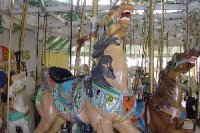Rhode Island State American Folk Art
Charles I.D. Looff Carousel
(Crescent Park Carousel)

Adopted on May 28, 1985.
The Charles I.D. Looff Carousel (also known as the Crescent Park Carousel) is the state symbol of American folk art which was adopted on May 28, 1985.
The Charles I.D. Looff Carousel (also known as the Crescent Park Carousel) is the state symbol of American folk art. The Crescent Park Carousel is all that remains of a large Victorian-era amusement park, which gave way to suburban development in the 1970s. Today, the carousel is a park by itself, as it still attracts visitors throughout a good part of the year. The Looff Carousel at Crescent Park in East Providence, Rhode Island, is one of the few handmade carousels still in use. It was designed and built in 1895 by Charles I.D. Looff, a native of Denmark, who was one of the earliest and most important manufacturers of carousels. Still functioning on its original site more than 100 years later, the Looff Carousel is one of the surviving examples of a once common American folk art. Because of its cultural significance, the Crescent Park Carousel, nationally recognized as a true masterpiece of wood sculpture, was rescued in the 1970's by a handful of East Providence residents. It was placed on the National Register of Historic Sites and Places in April 21, 1976. In 1985 the Rhode Island General Assembly proclaimed the carousel as the "State Jewel of American Folk Art". In 1987, the Department of the Interior's National Park Service designated the carousel as a National Historic Landmark. A $1 million restoration effort was completed in 1995.
The carousel features 56 hand carved wood jumping horses, 6 stationary horses, 4 chariots, a camel, a Wurlitzer military band organ, decorative panels, beveled mirrors, faceted glass jewels, electric lights, and colored sandwich glass windows.
Rhode Island State American
Folk Art:
Charles I.D. Looff Carousel
Crescent Park's story begins in 1886, when George Boyden first opened his amusement park on Bullochs Point. Called the "Coney Island of the East," and named after the unique shape of the beach. The Crescent Park Carousel is all that remains of a large Victorian-era amusement park, which gave way to suburban development in the 1970s. Today, the carousel is a park by itself, as it still attracts visitors throughout a good part of the year.
The Looff Carousel at Crescent Park in East Providence, Rhode Island, is one of the few handmade carousels still in use. It was designed and built in 1895 by Charles I.D. Looff, a native of Denmark, who was one of the earliest and most important manufacturers of carousels. Still functioning on its original site more than 100 years later, the Looff Carousel is one of the surviving examples of a once common American folk art. Because of its cultural significance, the Crescent Park Carousel, nationally recognized as a true masterpiece of wood sculpture, was rescued in the 1970's by a handful of East Providence residents. It was placed on the National Register of Historic Sites and Places in April 21, 1976. In 1985 the Rhode Island General Assembly proclaimed the carousel as the "State Jewel of American Folk Art". In 1987, the Department of the Interior's National Park Service designated the carousel as a National Historic Landmark. A $1 million restoration effort was completed in 1995.
The carousel features 56 hand carved wood jumping horses, 6 stationary horses, 4 chariots, a camel, a Wurlitzer military band organ, decorative
panels, beveled mirrors, faceted glass jewels, electric lights, and colored sandwich glass windows. The jeweled trappings and embellishments of the
jumping horses closely match descriptions of an 1894 Austrian Imperial Court "Carouselle," an elaborately costumed equestrian pageant and spectacle.
The Crescent Park Carousel is housed in its own specially-designed pavilion with a distinctive polygonal roof and onion dome. Double-folding doors
and windows not only allow a maximum of daylight to enter, but allow the Carousel to serve as its own best advertisement. Upper tiers of stained glass
windows, filter vari-colored light onto the moving mirrored surfaces of the carousel frame - a system developed before electrical illumination was
practical. A wide interior platform surrounding the carousel allowed for viewing at an optimum distance. All Looff carousel pavilions featured dozens
of benches and rocking chairs for a final touch of patron comfort. Of the dozens of Looff pavilions originally built around the country, the Crescent
Park model was the largest and most elaborate. For many years Looff's carvings and innovative designs have been regarded by historians of American
folk art as among the most distinguished representatives of their medium. The Crescent park Carousel is a veritable museum of his work.
The carousel is open from Easter through Columbus Day on Saturdays and Sundays. Additional days are added during the summer. Ride tickets are 75 cents each. The carousel can be rented for parties, weddings, and other functions, with special children's birthday party packages available.
Charles I.D. Looff
Born May 24, 1852, Schleswig-Holstein;
Died July 1, 1918, Long Beach, California
Originator of the Coney Island style carousel, Charles Looff is considered to be the first of the great American carousel manufacturers.
Looff settled in Long Beach in 1911 and lived above his carousel at the Pike. Later, Looff operated carousels and major amusements at Santa Cruz, Santa Monica, Redondo Beach, Venice, Ocean Park, and San Francisco. He built the Santa Monica Pier, was a major contributor to the Santa Cruz Boardwalk, and the founder of Playland in San Francisco.
The original Long Beach Looff carousel built in 1911 burned to the ground in 1943. Its replacement, a makeshift mechanism, remained until the demise of the Pike in 1979 and was sold piecemeal.
Even the "I.D." in Charles I.D. Looff has a story. He was born May 24, 1852, in Schleswig-Holstein and immigrated in 1870. "A Ellis Island official told Looff he had to have a middle name 'for his I.D.' (or identification), so he chose "I.D."
Rhode Island Law
The law designating The Charles I.D. Looff carousel as the official Rhode Island state symbol of American folk art is found in the State of Rhode Island General Laws, Title 42, Chapter 1042-4, Section 42-4-11
TITLE 42
State Affairs and Government
CHAPTER 42-4
State Emblems
SECTION 42-4-11
§ 42-4-11 State symbol of American folk art. - The Charles I.D. Looff carousel (also known as the Crescent Park carousel) is hereby designated as
the state symbol of American folk art for the state.
History of Section.
(P.L. 1985, ch. 50, § 1.)








